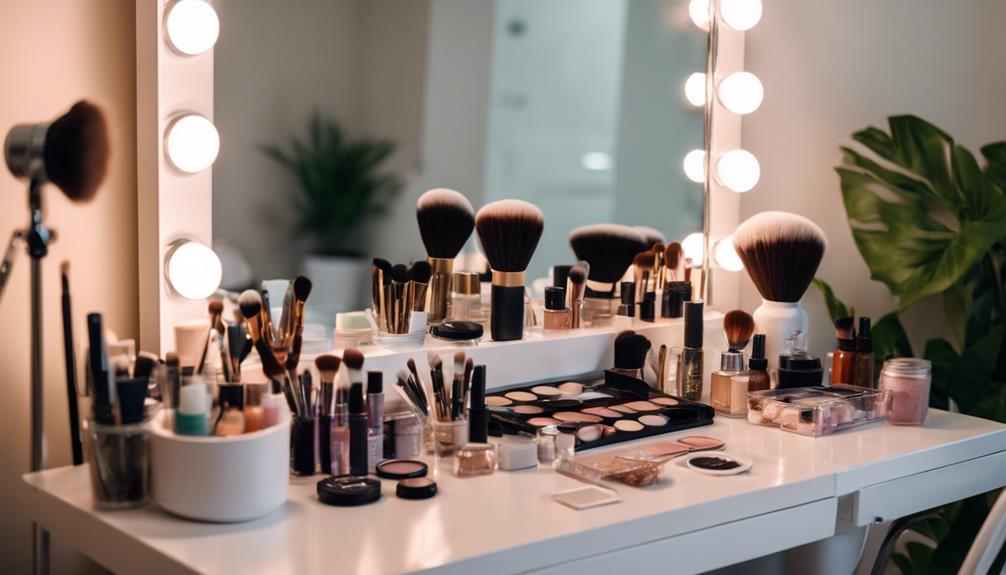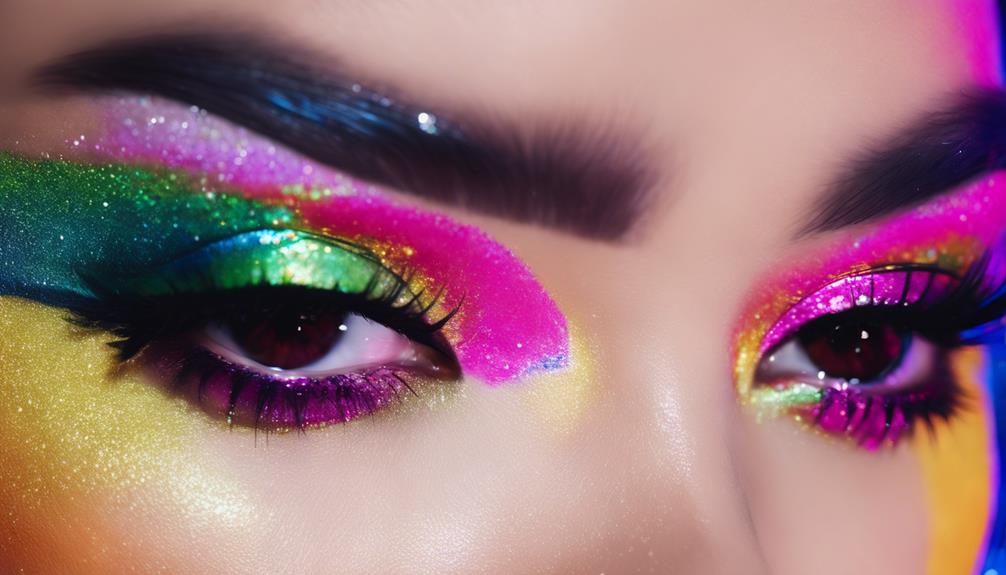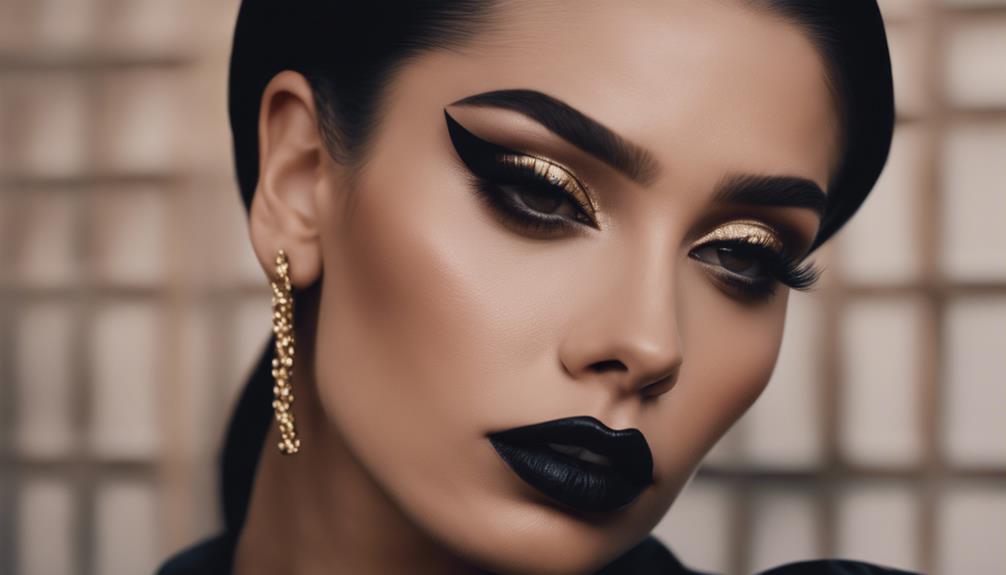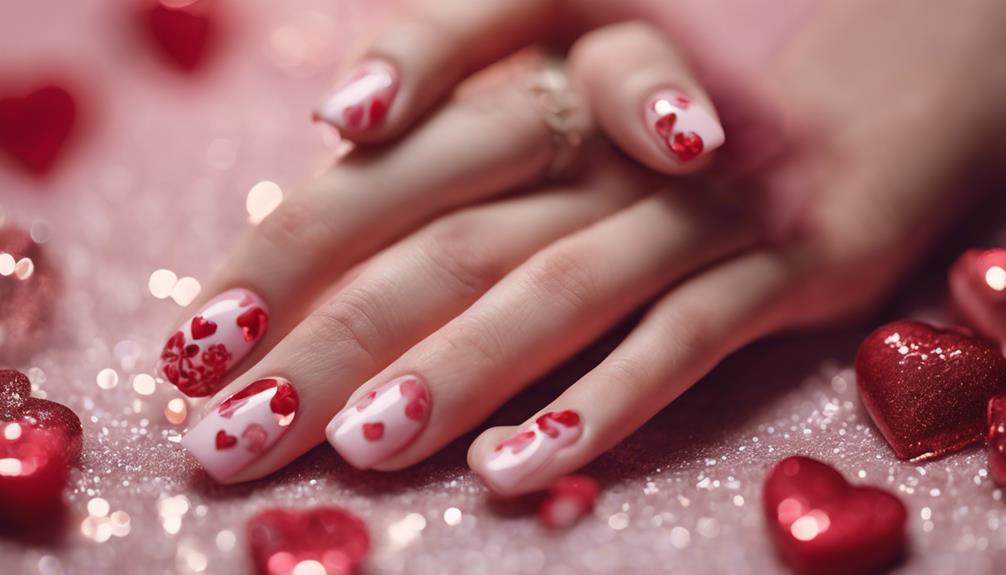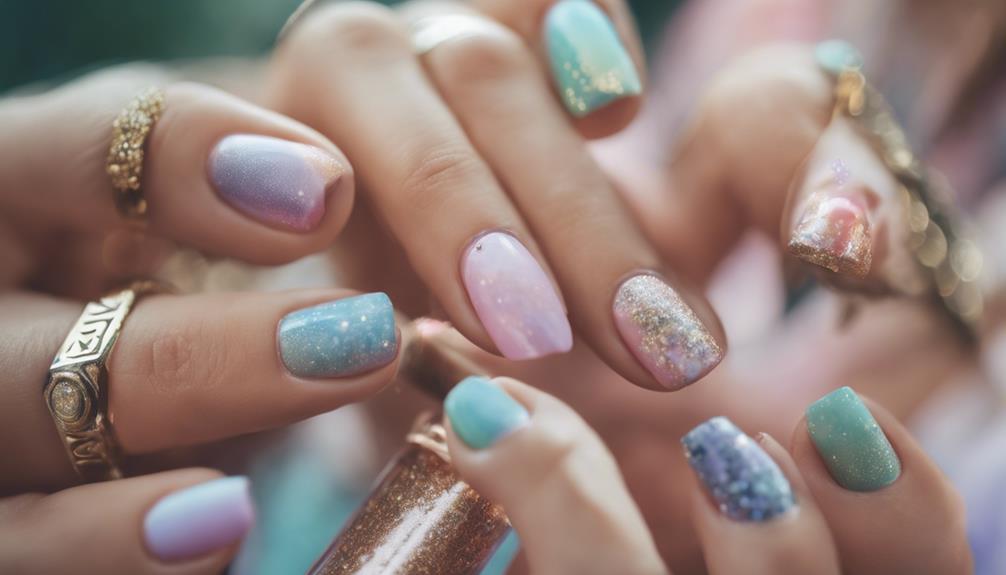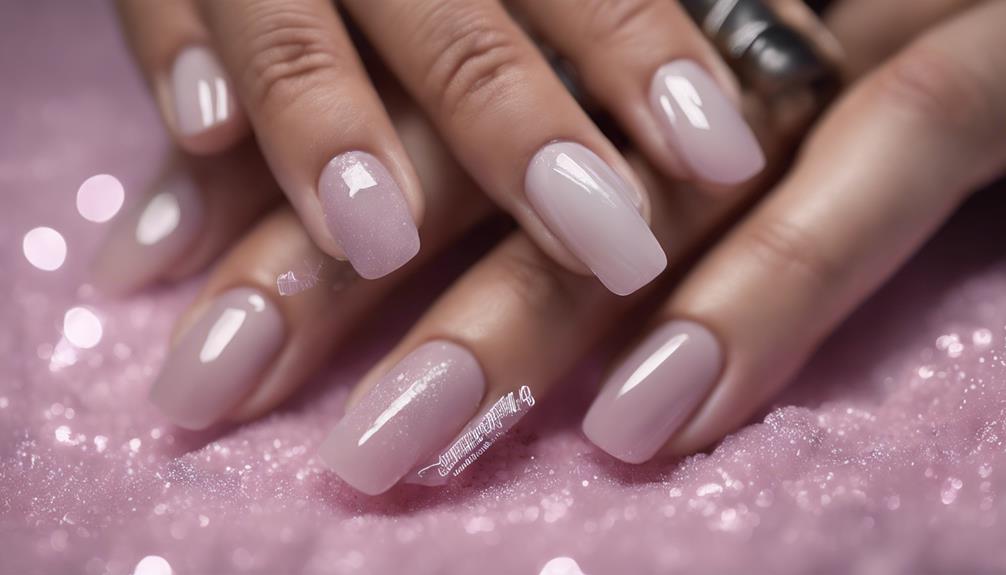When searching for chemical-free makeup and hair products, we aim to prioritize skin health, back cruelty-free initiatives, and advocate for sustainable beauty. These products use natural, safe ingredients, avoiding harmful chemicals like sulfates, parabens, and synthetic fragrances. Choosing trusted brands focusing on nourishing and benefiting skin and hair is key. It's about promoting a shift towards sustainability in the beauty industry while supporting ethical and environmentally friendly practices. By embracing chemical-free options, we take steps towards a healthier skincare routine and contribute to a cleaner planet. Find out more about top brands, ingredients to avoid, and eco-friendly packaging.
Key Takeaways
- Chemical-free products prioritize natural, non-toxic ingredients for skin and hair health.
- Look for brands using plant extracts, minerals, and clean components.
- Avoid harmful ingredients like sulfates, parabens, silicones, and synthetic fragrances.
- Transitioning to chemical-free skincare reduces irritation and supports sustainability.
- DIY haircare recipes with coconut oil and essential oils offer natural nourishment.
Benefits of Chemical-Free Products
Choosing chemical-free makeup and hair products not only safeguards our skin but also contributes to a cleaner environment. Clean makeup brands and natural organic makeup brands often prioritize using Certified Organic and natural makeup products, free from toxic chemicals that can harm our skin and the environment.
These eco-friendly practices not only benefit us but also support cruelty-free initiatives, ensuring that no animals are harmed in the production process. By opting for chemical-free options, we're promoting a healthier lifestyle while also advocating for ethical sourcing of ingredients.
Natural and organic ingredients in these products provide nourishment and benefits to our skin and hair, enhancing our overall well-being. Additionally, by supporting these brands, we're encouraging the industry to shift towards more sustainable and eco-friendly practices, shaping a future where beauty products are both safe for us and the planet.
Top Chemical-Free Makeup Brands

When searching for top chemical-free makeup brands, it's crucial to prioritize those with trusted natural ingredients that are safe for sensitive skin.
These brands emphasize using clean, non-toxic components in their products, ensuring a gentle experience for all users.
Trusted Natural Ingredients
Amid the growing demand for chemical-free makeup, top brands like Nude by Nature and Inika rely on trusted natural ingredients to craft safe and effective products. These brands steer clear of harmful synthetic ingredients such as parabens, phthalates, and synthetic fragrances, opting instead for natural components like plant extracts and minerals.
By selecting makeup brands like Eye of Horus and Youngblood, consumers can guarantee they're using products free from potentially harmful chemicals. The use of natural ingredients not only makes these products safer for the skin but also helps promote skin health.
Plant extracts, oils, and minerals are commonly found in the formulations of chemical-free makeup, providing a gentle and nourishing option for makeup enthusiasts. Trusting in these reputable brands that prioritize the inclusion of skin-loving natural ingredients can offer peace of mind to those seeking safer alternatives for their beauty routines.
Safe for Sensitive Skin
Trusted natural ingredients form the foundation of chemical-free makeup brands known for being safe for sensitive skin, such as Nude by Nature and Inika. These brands prioritize natural, non-toxic components, making them ideal for individuals with sensitive skin.
Clean beauty brands like Eye of Horus and Mirenesse also offer hypoallergenic products that are gentle on sensitive skin, devoid of parabens and synthetic fragrances. Options from Youngblood and Jane Iredale are specifically tailored to be safe for sensitive skin types, helping to prevent reactions and discomfort.
Choosing chemical-free makeup brands for sensitive skin can reduce the risk of redness and irritation, leading to a more comfortable makeup application experience. By opting for products that are designed to be safe for sensitive skin, individuals can enjoy the benefits of clean beauty without worrying about potential adverse effects, promoting healthier skin in the process.
Ingredients to Avoid in Hair Products

Let's steer clear of hair products containing sulfates, parabens, silicones, and synthetic fragrances due to their harmful effects on hair health. Sulfates can strip the hair of natural oils, leading to dryness and damage. Parabens, as preservatives, can disrupt hormone function and potentially cause skin irritation. Silicones may offer a temporary smoothing effect, but they tend to accumulate on the hair, causing dullness and weighing down the strands. Synthetic fragrances, often containing harmful chemicals, can result in scalp irritation and allergic reactions. To help you make informed choices, here's a breakdown of these toxic ingredients to avoid in hair products:
| Toxic Ingredients | Harmful Effects | Commonly Found In |
|---|---|---|
| Sulfates | Strip natural oils, lead to dryness and damage | Shampoos, Conditioners |
| Parabens | Disrupt hormone function, may cause skin irritation | Styling Products, Hair Treatments |
| Silicones | Build up, cause dullness and weigh down hair | Serums, Leave-in Conditioners |
Transitioning to Chemical-Free Skincare

We're now starting the process of moving towards chemical-free skincare for a healthier and more sustainable beauty routine. Chemical-free skincare involves using natural, organic, and non-toxic ingredients, avoiding harmful synthetic chemicals commonly found in skincare products.
Embracing chemical-free skincare can help reduce skin irritation, allergies, and long-term health risks associated with toxic chemicals like parabens, phthalates, and sulfates.
To adopt chemical-free skincare, look for brands that prioritize clean, safe, and effective ingredients. Reading ingredient labels, researching brands, and seeking professional advice are important steps in successfully shifting to chemical-free skincare products.
By choosing natural and organic skincare options, you not only take care of your skin but also support ethical practices, promote sustainable beauty, and contribute to a cleaner environment.
Make informed decisions when selecting skincare products to ensure they align with your goal of eliminating toxic chemicals from your beauty routine.
DIY Chemical-Free Haircare Recipes

Crafting your own chemical-free haircare recipes using natural ingredients can be a rewarding and beneficial way to promote healthier hair. By utilizing items like coconut oil, honey, and essential oils, these DIY haircare recipes can nourish and strengthen your hair without the harsh chemicals often found in commercial products.
Ingredients such as apple cider vinegar can enhance scalp health, while avocado provides deep conditioning benefits. One advantage of making your own chemical-free hair products is the ability to customize them to suit your specific hair needs and preferences.
Not only are DIY haircare recipes cost-effective, but they also offer an environmentally friendly alternative to store-bought products. Embracing natural ingredients in your haircare routine not only supports healthier hair but also aligns with a holistic approach to beauty and cosmetics.
Experimenting with DIY hair products can be a fun and empowering way to care for your hair naturally.
Importance of Cruelty-Free Beauty

Cruelty-free beauty is about more than just avoiding animal testing. It reflects our commitment to ethical sourcing practices, raising awareness about the realities of animal testing in the cosmetics industry.
Ethical Sourcing Practices
When selecting beauty products, it's crucial to prioritize ethical sourcing practices, particularly the importance of supporting cruelty-free brands. Opting for cruelty-free beauty products guarantees animal-friendly practices, contributing to a more conscious consumer culture that values sustainability and transparency.
Look for certifications like Leaping Bunny or PETA's cruelty-free logo to confirm a brand's commitment to ethical sourcing. Ethical sourcing in beauty goes beyond avoiding animal testing to include using sustainable ingredients, adhering to fair labor practices, and upholding environmental responsibility.
By choosing cruelty-free options, you aren't only promoting animal welfare but also supporting a shift towards more ethical and sustainable practices within the beauty industry. Ethical sourcing practices play a critical role in shaping consumer choices, encouraging brands to prioritize values that align with animal welfare, sustainability, and transparency.
It's through these conscious decisions that consumers can drive positive change in the beauty industry.
Animal Testing Awareness
Opting for beauty products that aren't tested on animals aligns with our commitment to promoting ethical practices in the cosmetics industry and supporting animal welfare. Choosing cruelty-free makeup and hair products is important in raising awareness about the impact of animal testing in the beauty industry.
By opting for cruelty-free brands, consumers actively support companies that uphold ethical and sustainable practices. The shift towards cruelty-free beauty products reflects a growing trend in the industry towards more responsible choices.
Understanding the importance of cruelty-free cosmetics empowers individuals to make informed decisions about the products they use. Animal testing remains a significant ethical concern in the beauty industry, making it essential for consumers to seek out cruelty-free alternatives.
Supporting cruelty-free brands not only benefits animal welfare but also drives the demand for more ethical and sustainable practices in the cosmetics sector. By choosing to prioritize cruelty-free options, consumers play a significant role in promoting a more compassionate approach to beauty.
Compassionate Consumer Choices
Embracing compassionate consumer choices in beauty entails actively supporting brands that prioritize ethical practices and animal welfare. Opting for cruelty-free beauty products not only aligns with one's values but also contributes to the movement against animal testing in the cosmetics industry.
When choosing beauty items, look for certifications like Leaping Bunny and PETA to make sure that the products are truly cruelty-free. These brands often use safer ingredients, making them not only ethical but also beneficial for your skin and the environment. By selecting cruelty-free beauty products, consumers can make a positive impact and show that beauty can be achieved without harming animals.
Moreover, many cruelty-free beauty brands offer innovative products that rival traditional options in terms of quality and effectiveness. Supporting these brands not only promotes ethical consumption but also encourages the development of new and exciting beauty solutions.
Making compassionate consumer choices in beauty can lead to a more sustainable and cruelty-free industry while still enjoying high-quality beauty products.
Sustainable Packaging in Makeup Industry

Crucial packaging in the makeup industry plays an essential role in reducing environmental impact and promoting eco-friendly practices. This approach involves using environmentally friendly materials such as recycled paper, glass, or biodegradable plastics to reduce waste and minimize the carbon footprint of products.
Brands that prioritize sustainable packaging often incorporate innovative design elements, offer refillable options, and utilize reusable containers to decrease reliance on single-use plastic. By opting for brands with eco-friendly practices and advocating for industry-wide changes toward more environmentally conscious packaging solutions, consumers can actively support sustainable packaging initiatives.
This shift towards sustainable packaging not only aligns with the increasing consumer demand for eco-friendly products but also underscores a shared commitment to combatting plastic pollution. Embracing sustainable packaging practices in the makeup industry represents a step towards a more sustainable future, where beauty products can be enjoyed without causing harm to the planet.
Frequently Asked Questions
What Is the Most Non-Toxic Makeup Brand?
When considering the most non-toxic makeup brand, several options stand out. Brands like RMS Beauty, Ilia Beauty, W3LL PEOPLE, 100% Pure, and Alima Pure are well-known for their commitment to using clean and natural ingredients in their products.
These brands prioritize organic and cruelty-free practices, avoiding synthetic chemicals and artificial fragrances. Consumers seeking non-toxic makeup can explore these reputable brands for a healthier beauty routine.
Is Elf Makeup Chemical Free?
Elf makeup isn't entirely chemical-free; it may contain synthetic ingredients like preservatives, emulsifiers, and colorants. While Elf focuses on affordability, its products aren't completely natural or organic.
However, they're cruelty-free, vegan-friendly, and free from phthalates, parabens, and sulfates. Ingredient lists vary, so it's essential to check each product's components for chemical-free qualities.
Elf's transparency enables consumers to make informed choices matching their preferences for clean beauty products.
What Makeup Brands Do Not Contain Pfas?
Some makeup brands that don't contain PFAS include Axiology, known for clean, vegan lip products, and Ilia Beauty, offering non-toxic formulations without PFAS.
When it comes to hair products, Rahua's clean hair care line is free from harmful chemicals like PFAS.
Opt for Saie's clean beauty products as well, dedicated to providing safe makeup choices.
These brands prioritize your health by excluding PFAS from their products.
Is Thrive Makeup Non-Toxic?
Yes, Thrive Makeup is non-toxic. The brand's commitment to using natural and plant-based ingredients guarantees that their products are free from harmful chemicals like parabens, sulfates, phthalates, and synthetic fragrances.
Thrive Makeup's focus on clean beauty, sustainability, and ethical practices makes them a reliable choice for those seeking high-performance cosmetics without compromising on safety or environmental impact.
Their Leaping Bunny certification further solidifies their dedication to cruelty-free and vegan beauty.
Conclusion
To sum up, transitioning to chemical-free makeup and hair products is like experiencing a revitalizing change for your skin and hair. By steering clear of harmful ingredients and choosing natural alternatives, you can elevate your beauty regimen while also promoting a healthier environment. Not only do chemical-free makeup and hair products enhance your natural beauty, but they also provide various benefits for your skin and hair. For example, the natural ingredients in creme makeup can help to moisturize and nourish the skin, while also providing a smoother and more seamless application. By incorporating these products into your routine, you can enjoy the benefits of creme makeup while also supporting a more sustainable and eco-friendly beauty industry.
Remember to check labels, research brands, and explore DIY options to guarantee you're making the best choices for your body and the planet. Make the switch today and witness the difference for yourself!


